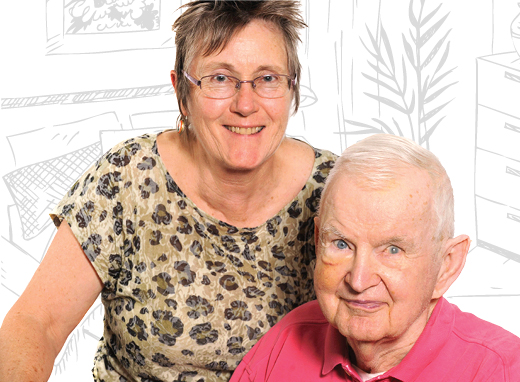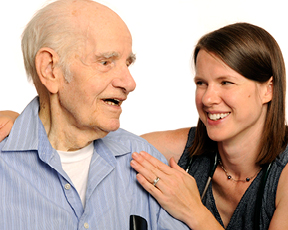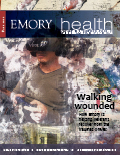The new house call

During her home visits with Stewart Moran, geriatrician Louise Horney can put his health in context of his current environment and his long life.
By Rhonda Mullen, Photography by Jack Kearse
Stewart Moran, 91, has a sweet temperament, a head full of white hair, and a smile that can light up the room. He likes watching British sitcoms and is amiable with the staff at Sunrise Assisted Living in Decatur, Ga., where he lives.
But the one thing that could put Moran in a black mood was a visit to the doctor. “As he declined, it became overwhelmingly impossible to get him to the clinic,” says his daughter, Nancy Yang. “By the time we got him there, he was so physically and emotionally drained that he’d be undone.”
That’s when Nancy and her husband, Emory primary care physician Bill Yang, decided to ask a favor of Emory geriatrician Louise Horney. She had been the doctor of Bill’s father, who also had lived at Sunrise. Could she come to the patient? Horney agreed, and during her visit, she uncovered a key to improving Moran’s health. His orders were written for medications to be administered at bedtime, which at Sunrise occurred routinely at 9 pm. But Moran went to bed around 8 pm each evening. When he was awakened an hour later, he’d just roll over and go back to sleep. The chart was marked as “meds refused.” Horney changed the order to 5 pm, and the problem was solved. Once Moran was back on his medications, he allowed his blood to be drawn.
“It wasn’t rocket science, but it’s a good example of what we knew already,” she says. “It makes sense for us to go to them.”
That visit in 2008 became the inspiration for a new domiciliary care program that Horney helped launch in 2010 on completion of a Fulbright in Turkey. The program brings Emory health care professionals to patients rather than the other way around. For more than a year now, Horney and her colleagues—geriatrician Candace Cato and geriatric nurse practitioner Karolina Graber—have been making the rounds at 11 assisted-living facilities throughout metro Atlanta. Among the three of them, they see about 200 patients each year in this outreach program of the Emory Clinic.
Their visits differ from the traditional house call where the family calls the doctor and she comes. Rather, the practitioners make regular rounds at assisted-living facilities, seeing several patients during a visit.
They go armed with a laptop computer, stethoscope, pulse oximeter, reflex hammer, otoscope, ophthalmoscope, sphygmomanometer, and geriatric medicine book. With these simple tools, they often are able to address small things that help keep patients healthy and out of the hospital.
“You have to do more detective work yourself,” says Cato, “but you are not as pressed for time as you frequently are in the clinical setting.” Horney finds it rewarding when she’s able to solve her patient’s health issues “without simply prescribing another pill.”
Medicare reimburses for these domiciliary visits, recognizing the health care cost savings that will result from reducing emergency room visits and hospitalizations.
The Emory providers say that the system has the advantage of allowing them to see patients in the context of where they live. “You get a better picture of who they were in the past,” Cato says. “You get to know their families. You see the pictures of them as a child. It makes the patient and doctor interaction more personal.”
|
Emory's domiciliary care program reinvents the house call to bring health care to seniors where they live. |
The visit
The Stewart Moran that Horney has come to know is a native of Sault Ste. Marie, the third oldest settlement in the country, just south of the Canadian border in Michigan. His father started a lumber business there and raised three boys, Moran being the baby. Moran himself lived most of his life in the town, marrying, raising children, and working as a public relations executive for the local electric company. In fact, he even served as postmaster for a year when there was no one else to deliver the mail. For retirement, he moved with his wife to Brevard, N.C., where they enjoyed milder winters, hiking in the Pisgah National Forest, and volunteering at the Brevard Music Center.
Horney also knows Moran’s health inside and out, from his history of congestive heart failure and dementia down to a small infection on his toe. Today she’s back to follow up on some problems he’s having with his ears and pain associated with arthritis. His daughter is there for the visit and fills the doctor in on recent developments while they wait for her dad to return from lunch. Apparently, he’s been going more often to the dining hall for his meals, something Horney is delighted to hear.
 Candace Cato & Karolina Graber Candace Cato & Karolina Graber
|
As Moran is wheeled in from lunch and transferred to the lift chair that his family calls the “rocket chair,” he has a smidge of barbeque sauce on his chin. “There’s the doctor,” he says on seeing Horney.
“You’re looking good,” she says. As she chats with him, she has a computer at the ready, reviewing his electronic chart. Then she takes out an otoscope, sliding between a lamp and side table to lean over and check his ears, which are full of wax. “I’m surprised you can hear at all,” she says.
Horney steps into a small kitchen area and draws the water to a comfortable temperature, mixing it with peroxide and mineral oil. She enlists Yang to help her hold a tray to catch the solution and explains to Moran that she’s about to flush his ear. As soon as she starts, he calls out, “That hurts.”
“This is just the first inning,” Horney says, continuing with her task.
“Dad, did you watch the Braves and the Pirates game last night? They went 19 innings,” says Yang, trying for distraction.
Moran’s response is another moan and a few select swear words. Horney stops the procedure briefly and asks, “Don’t you want to hear?”
“No,” Moran says.
“We’re going for the second inning,” Horney says. “Let’s try for a home run this time.” A minute later, Moran gets a reprieve as a staff nurse arrives to give him his medication, and Horney pauses in the treatment. But it has to be done, so she starts in, gently but firmly, on the other ear.
“That hurts,” Moran protests.
“It’s okay,” Yang says, holding her dad’s head.
“You can yell if you want,” says Horney. “Take some deep breaths.” And then in a gush, chunks of wax wash out of the ear.
“One more flush, and this is over. We’re at the bottom of the ninth.” Moran squinches his eyes and pulls up his knees. “Hang in there. Okay, bud, we’re done.”
Within a minute, Moran has recovered his sweet self. He holds out his finger for the portable pulse oximeter that measures oxygen saturation of the blood. He sticks out his tongue and says a feeble “ah” for Horney to check his throat. “After all that carrying on, is that the best you can do?” she asks.
He smiles.
The rest of the exam goes smoothly. Horney makes a note of a skin lesion behind the ear, which might be a basal cell cancer. She notices from the electronic chart that her patient has lost 15 pounds since January. She says she may swing by during the week to give him a shot of B12.
A geriatrician on the road
The visit with Moran is typical of ones that Horney, Cato, and Graber make in the course of the week. But many days are atypical. Sometimes they encounter the unexpected, arriving to find a patient much sicker than anticipated.
And some things are beyond the skills of these practictioners whether in the emergency department, clinic, or at home. “By the time a person gets to assisted living, something has failed physically,” Horney says. “There’s a lot we can’t fix. So we need to think about how do we make the end of life as easy as possible. What we try to do is find a balance with the patient and family about how aggressive they want to be in treatments and ER visits.”
She believes the Yangs are the ideal family. They don’t sweat the small stuff, but they are prepared to handle the big stuff. Horney believes Moran wouldn’t be able to function in assisted living without his family.
In turn, the Yangs say that Emory’s domiciliary care service lessens their burden. “In my opinion, this is the most wonderful program in the world,” says Nancy Yang. “We’ve haven’t had to go to the ER in more than a year.”
Horney is pleased with the progress the program has made in that year. She’d like to see it grow but not so quickly that the team can’t maintain high quality. She wants to preserve what makes it work, getting to know the patients, hearing their stories, talking with their families—all the things that help her navigate the complicated way of a geriatrician on the road.—EH
Overheard
Karolina Graber arrived at Coventry Place Assisted Living in Decatur to see three patients. First on her list is William “Jack” Lamb, a retired United Methodist minister. Signs on his door read, Knock loudly, then come in. Graber: Rev. Lamb, I’m Karolina Graber from Emory. How are you doing today? Lamb: I feel pretty good. I don’t have as much sense as I need. But I’m pretty good. Graber: I’m here to check on you. I have a note here from your daughter that she wants me to check your foot. How does your foot feel? Lamb: It feels pretty good. Graber: Can I take your blood pressure? Lamb: I guess I’ll let you do that. You think I might make it another year or two? Graber: I think so. So how old are you now? Lamb: Old enough to know better. I’m 94. Have I seen you before? Graber: Yes, I saw you last month. Lamb: What’s your name? Graber: Karolina. Lamb: [Singing] Carolina girl, won’t you come out tonight and dance by the light of the moon?... Where’d you go to school? Graber: I got my nursing degree at the University of Pennsylvania in Philadelphia. Lamb: I was just wondering if you knew what you were doing. Graber: How about you? Lamb: Well, I started out at Young Harris, then West Georgia. Let’s see, the Atlanta division of the University of Georgia, Emory for preaching. I’m a preacher. I can haul off and preach anytime. I started preaching at 17. I used to preach to my brothers out in the country. Graber: Does it hurt when I touch your foot? Lamb: No. I think both of my feet have five toes… Graber goes to look for scissors and gauze to dress an oozing sore on the patient’s foot. She doesn’t routinely carry these supplies with her but finds what she needs in Lamb’s room. He pays her no mind and goes on talking. Lamb: On vacation, my wife and I didn’t just go to the lake and go swimming. We traveled the world. I’ve been to every country in South America every country in Europe. I’ve been to all 50 states. When Graber returns, he asks, Have I seen you before? Healthy AgingThe domiciliary care program is one of the programs offered by the Emory Center for Health in Aging, which enables seniors to age safely and successfully in their homes and communities. These outreach efforts address a range of issues that affect seniors’ daily lives, from transportation and safe driving to research on how to prevent falls and other topics. |
|||



